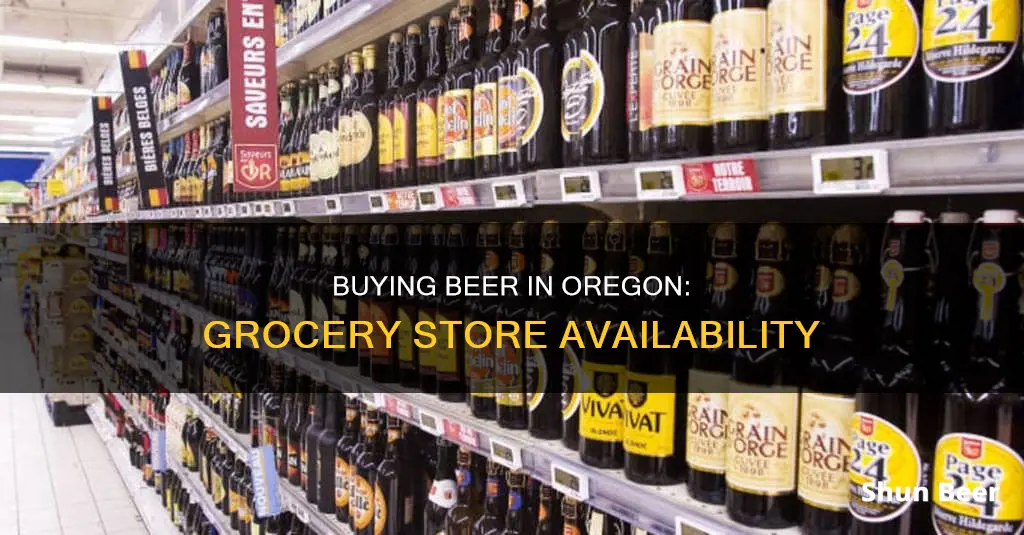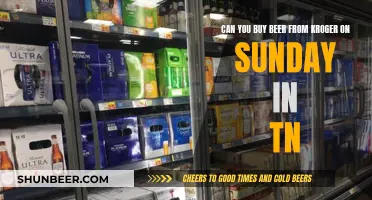
Oregon has a long history of regulating the sale and consumption of alcohol, dating back to 1844. The state controls liquor sales, and alcohol can be purchased from 7 a.m. to 2:30 a.m. daily. Beer, wine, and liquor can be sold for on- or off-premises consumption during these hours. So, can you buy beer in grocery stores in Oregon? The answer is yes, but only for off-premises consumption and within the designated sales hours. Grocery stores must sell alcohol in its original packaging and it is illegal for minors to purchase or attempt to purchase alcohol.
| Characteristics | Values |
|---|---|
| Can you buy beer in grocery stores in Oregon? | Yes |
| Hours of sale | 7 a.m. to 2:30 a.m. daily |
| Age restriction | 21 years or older |
| Open container law | Prohibits possession of open containers of alcoholic beverages in the passenger area of a vehicle on public highways |
| Legal alcohol limit for drivers | 0.08% BAC |
What You'll Learn

Beer can be bought in Oregon from 7 a.m. to 2:30 a.m
Oregon has a long history of regulating the sale and consumption of alcoholic beverages, with laws dating back to 1844. The state has strict guidelines surrounding alcohol sales, and the Oregon Liquor and Cannabis Commission (OLCC) holds a monopoly over the sale of all distilled beverages.
Beer can be purchased in Oregon from 7 a.m. to 2:30 a.m. the following day, seven days a week. These hours apply to both on- and off-premise retailers, including grocery stores, and are consistent across the state. While alcohol is available for purchase during these times, many businesses do not operate at the full extent of these hours.
Oregon's alcohol laws are designed to promote safety and responsible drinking. The state has a firm stance on preventing underage drinking and impaired driving, with strict penalties in place for violations. For example, it is illegal for anyone under 21 to purchase or possess alcohol in public within the state. Additionally, open container laws prohibit the possession of open containers of alcohol in the passenger area of a vehicle, whether it is moving or parked.
Oregon's extensive history of regulating alcohol sales and consumption has led to a thriving industry producing beer, wine, and liquor. The state is known for its microbrewing culture, with Portland being considered the microbrew capital of the nation.
Guinness Beer: Where to Buy and Enjoy a Pint
You may want to see also

Oregon has strict open container laws
The open container law in Oregon prohibits consuming and possessing open containers of alcohol in a vehicle. This includes drinking any alcohol in a motor vehicle on a highway, possessing an open container on one's person in a motor vehicle on a highway, and keeping an open container in a motor vehicle on a highway. An open container is defined as any bottle, can, or receptacle containing alcoholic liquor that has been opened, has a broken seal, or has had its contents partially removed. The law applies to both drivers and passengers, with some exceptions. For example, it does not apply to passengers in a limousine or a vehicle operated by a common carrier.
Violating the open container law in Oregon is a Class B traffic violation, with a presumptive fine of $265, a minimum fine of $135, and a maximum fine of $1,000. There is no jail time for a first-time offence, but it can lead to longer jail time for a DUI charge, vehicle impoundment, and loss of auto insurance.
Oregon's strict open container laws are part of the state's broader approach to regulating alcohol, which includes controlling the sale of liquor through OLCC-run liquor stores and establishments with liquor licenses, as well as studying alcohol and alcoholism at the Portland Alcohol Research Center. The state's history of alcohol regulation dates back to 1844, when the Oregon territories voted to prohibit alcoholic beverages. While this law was repealed in 1845, prohibition was reinstated in 1915, four years before national alcohol prohibition.
Today, Oregon allows the sale of beer, wine, and liquor for on- or off-premises consumption between 2:30 a.m. and 7 a.m. The state also permits the home delivery of alcohol. However, Oregon's strict open container laws remain in place, prohibiting the consumption and possession of open containers of alcohol in vehicles on public roads or highways.
Where to Buy Corona Beer?
You may want to see also

Oregon has a rich history of alcohol production
The first commercial brewery in Oregon was established by Swiss-born Henry Saxer in 1852. Known as Liberty Brewery, it was later purchased and expanded by Henry Weinhard in 1862, who renamed it City Brewery. Weinhard's company became the Northwest's largest brewery by the early 1880s and played a significant role in establishing Portland as the microbrewing capital of the world. Today, Portland hosts North America's largest beer festival, and Oregon has produced numerous award-winning beers.
Oregon's wine production also has a long history, dating back to the mid-19th century before it became a state. The industry collapsed due to prohibition in 1919 but was revived in the 1960s, and by 2007, winemaking was a $207.8 million business. Oregon is known for its pinot noir and pinot gris, with several official American Viticultural Areas, including the Willamette Valley, Southern Oregon, and Umpqua Valley.
In addition to beer and wine, Oregon has a thriving spirits industry. The state's documented distilling history began in 1934 with Hood River Distillers, and today, there are over 60 distilleries producing a variety of spirits, including bourbon, gin, rum, and vodka. The growth of the craft distilling industry has been supported by favourable regulations, allowing small distilleries to compete with international conglomerates.
Oregon's alcohol production is closely linked to its agricultural strengths, with access to high-quality local ingredients. The state is a national leader in wheat, cherry, pear, and berry production, providing distillers with a diverse range of fresh produce. Additionally, Oregon has a history of hop production, dating back to 1867, and remains the second-largest hop-producing state in the US.
Buying Beer After 9 PM in Wisconsin: What's the Deal?
You may want to see also

Alcohol laws vary from state to state
Oregon's alcohol laws cover a range of topics, including the sale of alcohol, open container laws, legal alcohol limits, and penalties for underage drinking and driving under the influence. Here is an overview of some of the key aspects of Oregon's alcohol laws:
Where and When Alcohol Can Be Purchased
In Oregon, alcohol can be purchased from a variety of retailers, including bars and restaurants, package and liquor stores, and grocery stores. Alcohol can be bought seven days a week, between 7 a.m. and 2:30 a.m. the following day. These hours apply to both on-premise and off-premise consumption. However, local regulations and individual business licenses may impose further restrictions on these hours.
Open Container Law
Oregon's open container law prohibits possessing open containers of alcoholic beverages in the passenger area of a vehicle on public highways, regardless of whether the vehicle is moving or parked. This includes any area designed to seat the driver or passengers, such as the utility or glove compartment. Limousines are exempt from this regulation, and passengers in a limousine can consume alcohol in the passenger area.
Legal Alcohol Limit and DUI Penalties
In Oregon, the legal blood alcohol concentration (BAC) limit for drivers is 0.08%. For commercial drivers, the limit is lower at 0.04%, and there is a zero-tolerance policy for drivers under the age of 21, with any detectable amount of alcohol in their system considered illegal. The penalties for a DUI conviction in Oregon include fines, license suspension, jail time, and participation in substance abuse treatment programs. The specific penalties vary depending on the number of convictions and other aggravating factors.
Underage Drinking
The legal drinking age in Oregon is 21 years old, and it is illegal for anyone under this age to purchase or possess alcohol in public. Minors caught in possession of alcohol can face fines of up to $250 for a first offense, diversion programs, driver's license suspension, and community service. Additionally, it is illegal for anyone other than a parent or legal guardian to provide alcohol to a minor, and parents can only do so in their private home while accompanying their child.
Oregon's alcohol laws are designed to promote safety and responsible drinking among its residents. The state has strict regulations surrounding the sale, distribution, and consumption of alcohol, which can differ significantly from other states. It is important for individuals to be aware of the specific alcohol laws in Oregon to ensure they are complying with the law and avoiding any negative consequences.
Chicago's Morning Beer Buying: What's the Deal?
You may want to see also

Oregon has strict laws against underage drinking
Oregon law prohibits the sale of alcohol to anyone under the age of 21. The OLCC takes this very seriously and any licensee caught selling liquor to a minor will have their license suspended. The only exception to this rule is that a parent or guardian may give alcohol to their child under the age of 21 if they are in a private residence and accompanied by the parent or guardian. It is also illegal for anyone to knowingly allow a person under 21 to consume alcohol on their property, unless it is supplied by a parent or guardian. These laws are in place to protect minors from the dangers of alcohol and to prevent underage drinking.
The penalties for providing alcohol to a minor are severe. A first conviction results in a fine of at least $500, while a second conviction incurs a fine of at least $1,000. A third or subsequent conviction carries a fine of at least $1,500 and a minimum of 30 days imprisonment. These penalties apply to anyone who sells, gives, or otherwise makes alcohol available to a minor, including licensees, employees of licensees, and those who control private property where alcohol is consumed.
In addition to the legal consequences, Oregon also has educational programs and resources to prevent underage drinking. The Portland Alcohol Research Center, for example, is a dedicated effort funded by the National Institute on Alcohol Abuse and Alcoholism. The center has trained medical students in alcohol-related issues for over 30 years and published numerous papers and articles on the subject.
Thanksgiving Beer Run: Texas Shopping Laws Explained
You may want to see also
Frequently asked questions
Yes, you can buy beer in grocery stores in Oregon.
You can buy beer in Oregon from 7 a.m. to 2:30 a.m. every day of the week.
No, Oregon has an open container law that prohibits the possession of open containers of alcoholic beverages in the passenger area of a vehicle on public highways.
The legal drinking age in Oregon is 21.







